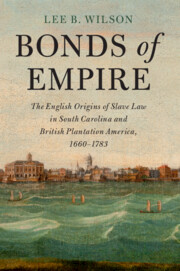 Bonds of Empire
Bonds of Empire Published online by Cambridge University Press: 02 July 2021
British newcomers to South Carolina saw no irreconcilable tension between English law and the ownership of slaves, and in Chapter Five I explore how administrative law in occupied Charlestown evolved to manage an increasingly mobile slave population. Rather than reforming colonial slave law, British administrators and military officers relied heavily upon colonial precedents as they balanced their need to maintain South Carolina’s plantation economy against their desire to employ the labor of slaves in British army departments. Individual British administrators also learned to buy, sell, and argue over slaves, adopting slavery’s legal language as they sought to supplement their incomes and build wealth. As they established their own plantations and confiscated the human property of people they called rebels, they, too, treated slaves as things on a daily basis, replicating local legal practices that did not appear from their perspective to be maladaptive. Consequently, the legal administration of occupied Charles Town tended to support rather than undermine slavery as an institution, despite growing antislavery sentiment in England.
To save this book to your Kindle, first ensure [email protected] is added to your Approved Personal Document E-mail List under your Personal Document Settings on the Manage Your Content and Devices page of your Amazon account. Then enter the ‘name’ part of your Kindle email address below. Find out more about saving to your Kindle.
Note you can select to save to either the @free.kindle.com or @kindle.com variations. ‘@free.kindle.com’ emails are free but can only be saved to your device when it is connected to wi-fi. ‘@kindle.com’ emails can be delivered even when you are not connected to wi-fi, but note that service fees apply.
Find out more about the Kindle Personal Document Service.
To save content items to your account, please confirm that you agree to abide by our usage policies. If this is the first time you use this feature, you will be asked to authorise Cambridge Core to connect with your account. Find out more about saving content to Dropbox.
To save content items to your account, please confirm that you agree to abide by our usage policies. If this is the first time you use this feature, you will be asked to authorise Cambridge Core to connect with your account. Find out more about saving content to Google Drive.